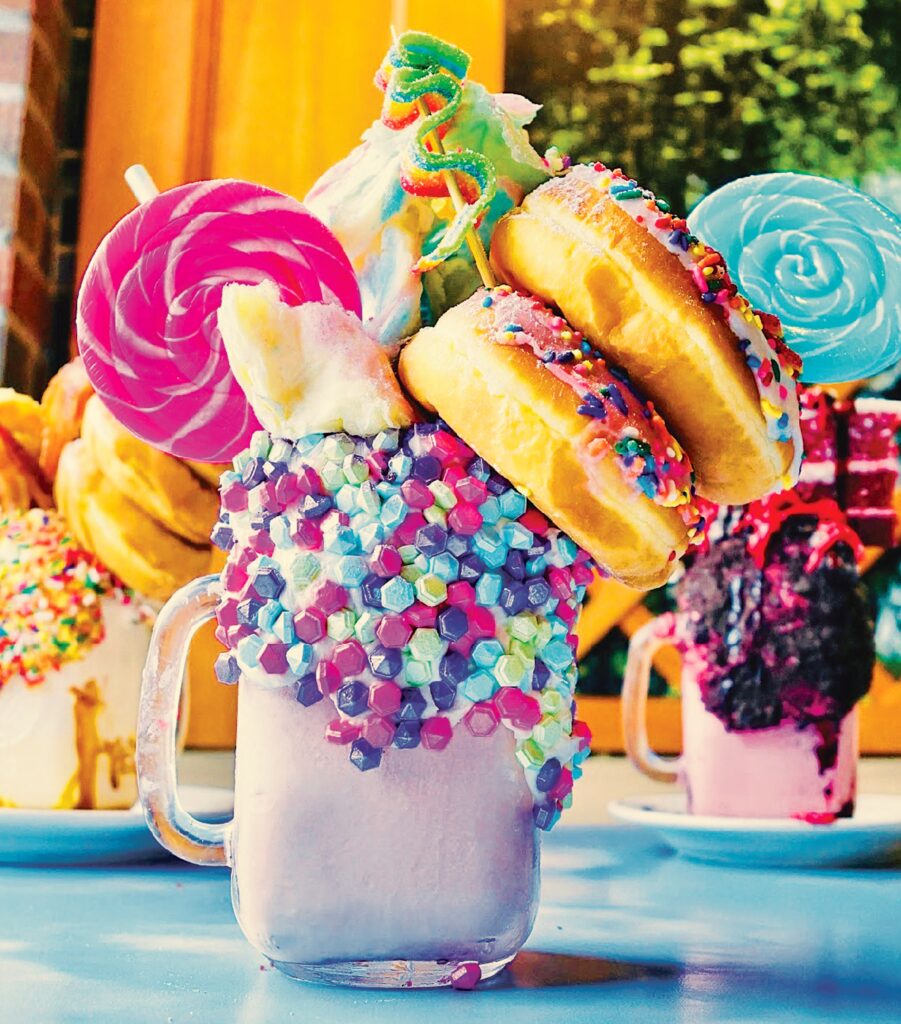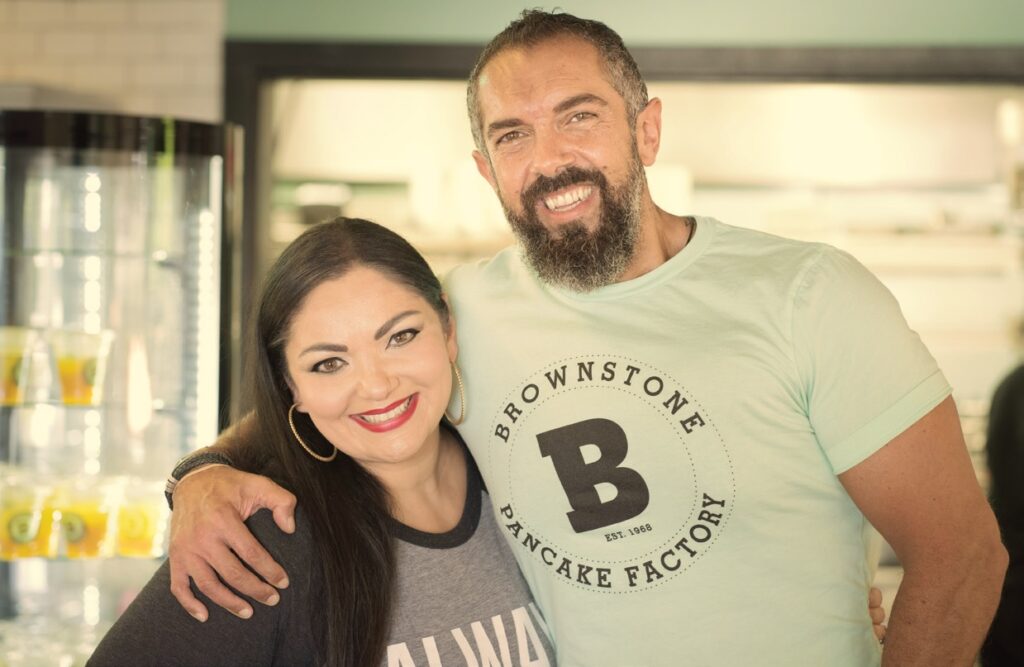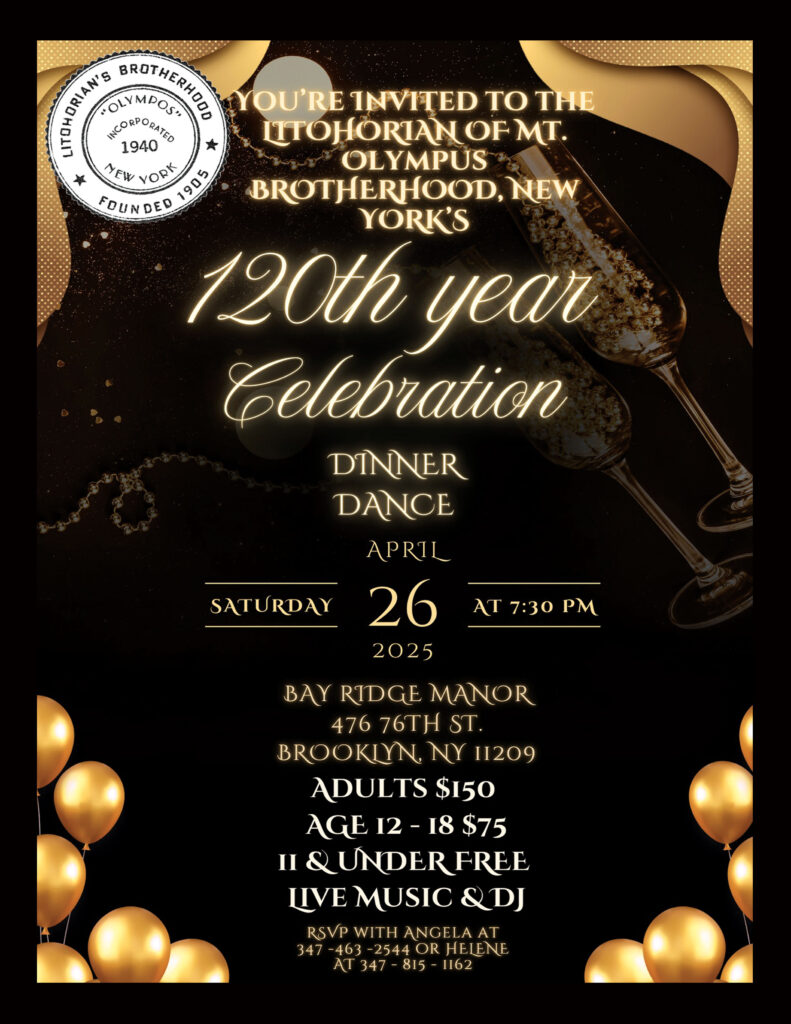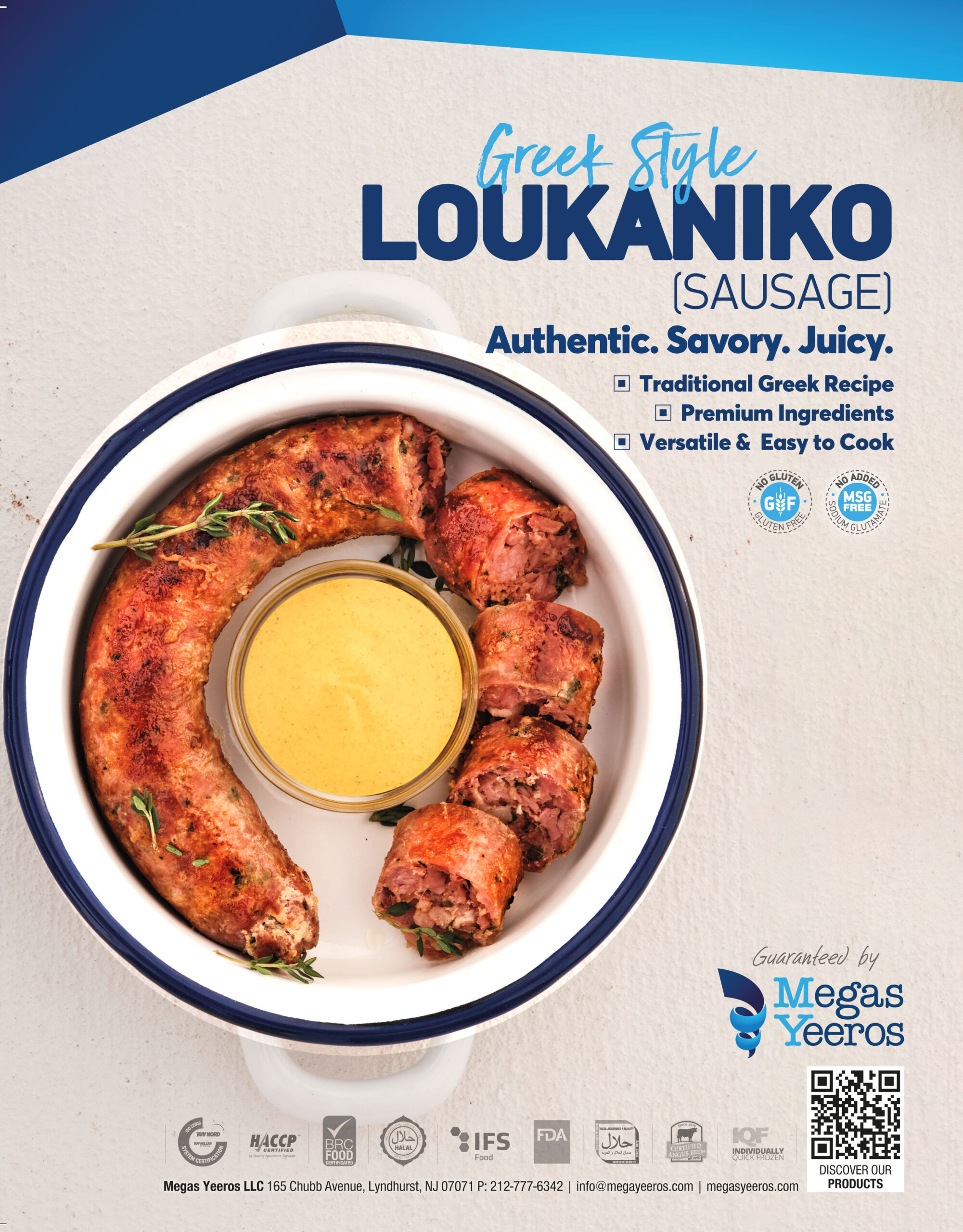Brownstone Pancake Factory’s Over-the-Top Success
Posted by estiator at 10 September, at 06 : 30 AM Print
COVER STORY

“Insane” plates, thrilling experiences, and warm welcomes propel Bobby Bournias’s New Jersey phenom.
By Michael Kaminer
THE GREATEST SHOW IN NEW JERSEY isn’t in a concert hall or sports stadium. The spectacle is taking place every day at Brownstone Pancake Factory, whose four locations serve over-the-top creations that make eyes pop and jaws drop.

It’s not just the notorious Fried Oreo Cheese-cake Pancakes, Hershey’s/M&M Cupcake Shake, or Buffalo Chicken Insane Fries that are setting social media on fire. It’s the stores themselves. One Brownstone Pancake Factory location boasts a VW bus parked inside; another features the slightly surreal sight of a full-size, working carousel. There are classic, arcade-style claw machines that let kids of all ages fish for prizes. And custom-made, mint-green La Marzocco espresso machines, imported from Italy, make coffee aficionados gasp.
“We’re known for these crazy, whimsical, over-the-top experiences,” says Bobby Bournias, who opened the original Brownstone Pancake Factory location in Edgewater, New Jersey, in 2014. “We’re always trying to come up with something creative, unique, and different.”
Instagram abounds with dazzlingly colorful examples: Funnel Cake Nutella Pancakes. Froot Loops Cereal Pancakes. Fruity Pebbles Churro French Toast. Girl Scout Cookie Pancakes. And there are genius, pop-culture-inspired moments like Shark Week Pancakes, covered in blue syrup, with candy shark fins, a shark lollipop, and a little cupcake whose blue icing holds a fin.“We’re a destination restaurant, with people who travel from all over, and social media has been a big driver of our success,” says Bournias, whose sister, Maria, is Brownstone Pancake Factory’s CFO. “We have about 160,000 followers on Instagram, and more than 300,000 on TikTok. It’s also part of our own social fabric. Our staff is just as excited to do videos and photoshoots as our customers are. It makes for a really cool work environment.”
The result: wildly successful restaurants with long lines of regular customers and first-time guests drawn by extraordinary word of mouth and seemingly infinite social-media sharing of visually stunning dishes, like the Very Pink Barbie Ultimate Insane Milkshake, which looks like it sounds; it earned 5,000 likes on Instagram and many “Oh, wow!” comments.
The Barbie shake is a textbook example of a Brownstone Pancake Factory inspiration, he says. “When the Barbie movie launched, we decided to introduce a Very Pink Barbie Shake on a Milkshake Monday, when we unveil new flavors. People saw it on social media and rushed in to get the shake for the movie or for parties. We sold pink Barbie stuff, memorabilia, cotton candy. Customers went wild for it.”
Barbie, pink milkshakes, and carousels are a long way from Bournias’s previous career as a mergers-and-acquisitions attorney at the global law firm Sullivan and Cromwell, and Maria’s former life as a tax senior manager at international consultancy Deloitte. But their success with Brownstone Pancake Factory is deeply rooted in their family’s history in hospitality—and in their Greek heritage.
“Maria and I are children of Greek immigrant parents, and we got educated because that’s what our parents wanted,” Bournias says. His parents, Pete and Irene Bournias, emigrated from Chios in the 1950s and opened the M& A Diner, a beloved downtown Jersey City restaurant, in 1968. Both siblings went to law school—Bobby at Seton Hall University, and Maria at Rutgers Law School.
“The restaurant was part of our childhood, ”Bournias says. “We had a small diner car. Jersey City wasn’t great when we grew up, but it started developing and gentrifying, and it got to the point where my dad recognized we had to expand and create something special.”
In the 1980s, Pete and Irene rebranded the restaurant as the Newport Pancake House, which became a huge success. In 2005, Bournias “took a break” from Sullivan and Cromwell to reinvent the restaurant again, christening it the Brownstone Diner, and making pancakes the focus of the menu.
Bournias’s innovation wasn’t just about growth; it was about survival. The government of Jersey City had threatened to take over the diner through eminent domain to enable residential construction. “We fought it,” Maria Bournias remembers. “The neighborhood didn’t want us to leave.” Rebranding as Brownstone Diner “was part of an effort to preserve our family restaurant,” she says. “We fought, and we won, but we warned our family that it could happen again.”
Not only did the Brownstone Diner regain its foothold in the neighborhood, but word got out about its mega-sized breakfasts, and Guy Fieri featured the restaurant on a 2008 episode of his Food Network series Diners, Drive-Ins & Dives.“It became wildly successful,” Bobby says. “I didn’t go back to law. I stuck with hospitality, which I had always loved. Maria continued to work at an accounting firm, but our younger sister, Zoe, helped at the store.”
The success of Brownstone Diner also sparked much bigger ambitions for Bobby. “My father’s vision and mine were different, «he says. “I wanted to grow and to think outside the box, expand the menu, and reimagine for how we presented food and the overall diner experience.”
With that leap, Brownstone Pancake Factory was born in 2014. “After working with my family for eight years, I went off on my own and opened Edgewater, our first location,” Bournias recalls. “That’s where I was able to explore and develop a lot of these crazy, whimsical, over-the-top experiences, and that’s what we’ve become known for.”
To develop the Brownstone Pancake Factory brand, Bobby and Maria Bournias worked with a small, smart staff, “but no outside consultants,” Bobby says. His wife, renowned designer Vanessa Deleon, gave the stores their retro-cool look. “Deleon immersed the design of the space in a 1950s chic look that enhances the entire experience. It exudes a laid back, lighthearted charm,” enthused the True Residential website.
Spearmint green is a signature color. Booths are covered in custom, logo-emblazoned fabrics. Custom wallpaper, with oversize newspaper-style typography, displays the Brownstone Pancake Factory brand. Some stores have an “upside-down” room, with clouds on the floor and “greenery” on the ceiling.




“I’ve always tried to come up with something creative, unique, and different,” Bournias says.“My menu ideas stem from the childhood foods I loved, from cookies to cereals. We just started to bring certain things together. Our Fruity Pebbles Insane Shake and Fruity Pebbles Waffle were, of course, inspired by Fruity Pebbles. No was doing anything even close to it when we introduced it.”
Likewise, the now-famous Fried Oreo Cheesecake Pancakes “were absolutely new. Until we started doing it, no one was offering anything like it. I think we were the catalyst, honestly, for a new kind of restaurant experience,” he says. “And customers can’t just whip up these dishes at home, which makes the dining-in experience even more important.”
While heaping plates of premium ingredients might seem intimidating to some operators from a cost perspective, Bournias says that overjoyed customers—most of whom become repeat visitors and ambassadors—more than make up for it.
“As far as costs go, it’s not an issue to use these kinds of ingredients,” he says. “My biggest concern is creating the greatest experience for our customers. Volume will dictate and resolve any issues around cost. A lot of restaurateurs worry more about labor costs and food costs, which makes sense. But if you worry more about the menu and the experience, and you increase your volume by 20 percent or 30percent, then it doesn’t matter.”
Rather than settle on a commercial pancake flour, Bournias approached a food scientist to create a custom flour “to make the most perfect pancakes,” he says. “Most restaurants use flour from a handful of companies. Ours took months to perfect, adding or subtracting rice to the flour and tweaking other ingredients. It’s proprietary to us, and it’s bagged and delivered to our stores. It’s perfect for what we do.”
Bournias brings the same philosophy to procurement—often a challenge, since so many Brownstone Pancake Factory menu items include highly specialized ingredients. “I’m not cherry-picking to find the least expensive products,” he says. “I’d rather use premium products. That’s part of our success—give the customer the best you possibly can, and they’ll come and come back.”
Maria Bournias agrees. “With respect to procurement, we can’t even look at your everyday list of suppliers,” she says. “When we come up with a new idea, we have to look at websites and other resources to satisfy whatever creative thing we’re trying to produce at the time. It’s not about calling a Sysco and ordering. We’ll get something in mind, then find a supplier that can deliver.”
Inspiration can also dictate where the siblings end up procuring ingredients. “There was a famous crumb-cake store near our Brick location. It was very popular. So we created a crumb cake pancake,” Bobby says. “We added it to the batter, and loaded it on top of the pancakes. We’ll also get candy makers to create one-off items for some of our creations, or partner with specialty and artisan bakers. Anyone can make something with ingredients they pickup anywhere. But we’re driven to be creative in our food and variety.”
Even the coffee at Brownstone Pancake Factory has personality to match the menu. “We serve organic coffee sourced from Guatemala, Colombia, and Peru,” Bournias says. “I developed the blend with Coffee Associates, a family importer and roaster in Edgewater. It’s a tremendous cup of coffee, and it’s sold by the pound at all our locations.” The coffee is sold under Brownstone Pancake Factory’s own label.
The company now employs more than 200people at its four restaurants. By the end of2024, Bournias expects to open two more Brownstone Pancake Factory locations. “We’re looking at another one in New Jersey, and we’re also eyeing Florida and up and down the East Coast. If we open Florida, and it does well, we can look at other neighborhoods in the region, including the Carolinas and Georgia.”
Until now, he adds, “our expansion has been self-financed, with no partners or investors. Butan aggressive growth strategy will require capital, and human capital. You need the right people to operate each restaurant. We hire from within, and there are already great people with us who want to go out of state to help us grow.”
We love hospitality. And we’re very proud Greek- Americans. It’s a tremendous story, because there are so many families across the country whose stories and backgrounds echo ours.
But franchising is not in the company’s future, he says. “We want to grow carefully. Part of what makes us special is that it still feels like a family restaurant. We have a unique connection with our customers. You can’t emulate that when you grow corporately.”
Experiential dining also helps make the business “recession-proof,” he says. “I don’t feel like we’re in the food business. We’re in the experience business. Anyone can make a nice plate of food and offer great service—that’s the foundation to a great restaurant. We want to take it a step further. iHOP doesn’t have that touch. We’re personalities, and it’s not just a job for us. Every customer who walks through our doors has a choice. We have to treat and serve them with privilege. Give them a reason to comeback. Do that table to table, and you’ll always foster success and growth.”
The high-touch experiences and relentless creativity are actually investments in the brand’s future, he says. “As long as you create an experience that goes above and beyond the food, you’ll have a business that lasts forever,”Bournias says. “There are a lot of concepts today where there’s no service—I’m getting food, it’s easy, it’s on my lap, I’m watching TV. Restaurateurs have to keep in mind that food in and of itself is the fabric and background of human society. Most people interact around food, whether it’s family functions, business meetings, or intimate occasions. When you add the element of experience, and make it enjoyable, that will stand the test of time.”

Pete Bournias, the family’s patriarch, still owns a restaurant in Jersey City; Irene Bournias passed away in 2007. “She was a hardworking woman,”Bournias says. “She had health problems, but until the day she died, she wanted to be in the restaurant. She was a huge inspiration. Her philosophy of hospitality is what we try to impart to our staff today. If you see a familiar face, recognize and acknowledge them. Make them part of the family. We want regulars, people who come on their special day and every day. My mother knew how to make that happen.”
A picture on the Brownstone Pancake Factory website features an apron-clad Bobby and a beaming Maria as toddlers on the floor of their parents’ diner. “Bobby and Maria at their first job,” the caption jokes. “We love hospitality. And we’re very proud Greek-Americans. It’s a tremendous story, because there are so many families across the country whose stories and backgrounds echo ours.”














